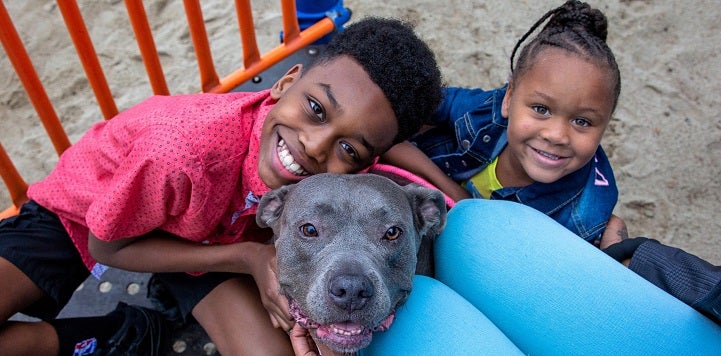
Keeping Pets with their Families
Legislative Team Ramps Up Fight Against Breed Restrictive Housing Practices
It’s no secret that we love our companion animals. According to the American Pet Products Association’s 2019-2020 National Pet Owners Survey, 67% of households have at least one pet. And for most of those families, giving up a pet is something that happens only when people are faced with extreme circumstances like a financial crisis, health problems or challenges with finding affordable, pet-inclusive housing. Unfortunately, our entire nation found itself facing all those circumstances last year as COVID-19 swept across the globe.
Solving financial or health-related issues is certainly not within our scope. However, the same cannot be said for trying to remedy housing challenges, which respondents in our recent Pet Owner Surrender data analysis named as the second most common reason why pets are relinquished to shelters. With millions of Americans at risk of losing their homes, we knew we needed to act quickly. While Chief Executive Officer Julie Castle urged people to become part of the solution to housing insecurity, our legislative team was hard at work launching a new initiative focused on Keeping Pets with their Families.
Supportive Statistics and Anecdotal Data 
After decades of working in the animal welfare field, we know that housing challenges take many forms: a lack of rental properties that accept pets; exorbitant pet deposits or monthly fees; and a lengthy and arbitrary list of breed restrictions enforced by landlords as well as insurance companies.
Since hard data is very effective at motivating change, we distributed a pet-inclusive housing and insurance survey late last year to landlords, homeowners and insurance companies to test our theories. We are still collecting results, which will be released in the future, but early responses included:
- Difficulty finding pet-friendly rentals was called out in 35% of the 736 housing-related comments;
- Dog breed and/or size restrictions were noted in 22% of responses; and
- 21% cited large deposits and/or an increase in monthly rent due to their pet.
Breed Restrictive Practices
Apart from the financial barriers to finding a place to live with pets, dog breed restrictions among landlords and insurance companies was the most commonly cited challenge by respondents. Our early survey returned its share of responses from people who fudged on describing their dog’s breed, like calling a Rottweiler a “black lab mix.” Sadly, the insurance companies' sometimes-mystifying and always-arbitrary banned breeds paint many families into a corner.
A recent Forbes article found 42 insurance companies that restrict specific breeds that run the gamut from Dobermans, pit bull terriers and Rottweilers (present in 100% of the companies) followed by wolf hybrids (93%), Akitas (79%), German Shepherds (45%) and Huskies (38%). The list is rounded out by a bizarre hodgepodge of allegedly problematic breeds present in 5% of company policies: American bulldogs, Shar-peis, Shiba Inus, Weimeraners, Dogo Argentinos and—perhaps weirdest of all—coyote dogs and dingoes.
Curiously, and in what seems like an underhanded way to further target pet owners, the Forbes piece notes that “these lists are often hidden from consumers’ view in filings made by insurers to state insurance departments.”
Further victimizing specific communities, Ed Jamison, CEO of Operation Kindness, notes that “these types of restrictions, which disproportionately impact BIPOC communities, cause suffering for people and their pets. Families should never be forced to make the difficult decision to rehome their pet due to housing restrictions.”
Collaborations on Housing Issues
While there are clearly a lot of hurdles to overcome in this realm, our new initiative is tackling some of the most egregious policies harming families with pets and filling up our animal shelters—and we are far from the only ones:
- After realizing her properties were among the few in Minneapolis that accepted pit bull terrier like dogs, a landlord started My Pit Bull is Family in 2011 to end housing and insurance restrictions. Today, the organization runs the country’s largest database of rentals that accept all dogs, regardless of breed.
- Animal Farm Foundation (AFF) has long advocated against laws and policies that target dogs based on how they look, “practices that also uphold discrimination against humans.” The organization also has a guide available on its website with lots of resources on housing and insurance for dog owners and updates on current legal cases with which AFF is helping.
- Best Friends is the sole animal welfare agency involved in California’s Housing Now! coalition, comprising 130 allied landlords, realtors and community, faith and labor organizations. The coalition is working to “stop Wall Street landlords, big real estate, and luxury developers from pushing California families out of their homes and fight to keep housing affordable for all of us. Corporate landlords are making record profits on communities where working families and people of color are just getting by and we’re pushing back.”
Current Senate and House Bills
And we continue our longstanding practice of taking on legislation that negatively impacts animals and their people. Among the current bills we’re working on:

- Illinois Senate Bill 154 would require property owners who receive state funding for low-income housing to allow tenants to have well-behaved dogs and cats of any breed, size, or weight. Illinois Senate Bill 1672 has been introduced to stop homeowners and renters insurance companies from being allowed to drop coverage, deny coverage, and/or charge a higher premium based solely on a pet’s appearance. However, because of opposition from insurance companies, the bill would simply require them to collect data on dog bite claims that includes the breed and note whether breed identification was done by visual identification alone (Studies have shown that visual identification of a dog of unknown heritage is unreliable.).
- Iowa Senate File 143 and Missouri House Bill 365 and Senate Bill 107 have been introduced to ensure dangerous dog laws take the most effective approach. This legislation will prohibit breed restrictions by municipalities and protect the responsible pet owner's right to adopt, own, and care for the dog(s) of their choice.
- Nevada Senate Bill 103 would stop insurance companies from canceling, not renewing or charging homeowners more for a dog’s breed or mix of breed since there is no scientific evidence that certain breeds are inherently more dangerous than others.
- Texas House Bill 3798 would prevent public housing authorities from creating pet policies that label certain breeds of dogs dangerous, thereby banning them from their communities.
Legislators need to hear that their constituents care about these issues impacting pet ownership, and you can help us by taking action on any of these bills. Really, though, we need people to contact their insurance commissioners in every state and tell them that pet-friendly housing is an important issue—even if we don’t have a bill in that state.
Our early survey results include comments from everywhere; legislators and commissioners need to know that yes, housing insecurity is happening in their communities and the National Association of Insurance Commissioners (NAIC) should appoint a task force to examine the problem and draft model regulations to prevent this practice.
The bottom line is that we are working at every level and partnering with agencies both within and outside of animal welfare. Removing barriers at a programmatic level and feeding our work on policy change takes a lot of heavy lifting, and the more organizations that are involved, the better.
In fact, as people working in communities and seeing the impact of housing and insurance issues every day, your voices are more powerful than ours because they bring a real authenticity to the problem.
No one should have to choose their home over their pets, and we stand ready to help any people or organizations that want to dig into this issue in their community. Will you join us?
If you have questions about the work of Keeping Pets with their Families, you can email us at legislative@bestfriends.org
Additional Resources:
Petitions to Improve Pet-Friendly Housing
Petitions to Fight Dog Breed Restrictions
24PetWatch Owner Surrender and Acquisition Source Analysis
Legislative Alerts and Updates
Find a 2025 Action Team Near You
Breed Restrictions in the Homeowners Insurance Industry
Editorials:
Charting Progress and Challenges in the Fight Against Breed Restrictions
COVID-19: Preparing for the Housing Crisis
Podcasts:
More than 40 Million Pets at Risk of Eviction
Vlogs:
Keeping America’s military members and their pets together
Laura Donahue
Director of legislation and advocacy
Best Friends Animal Society
If you enjoyed this program spotlight, you can find our complete catalog of spotlights here.